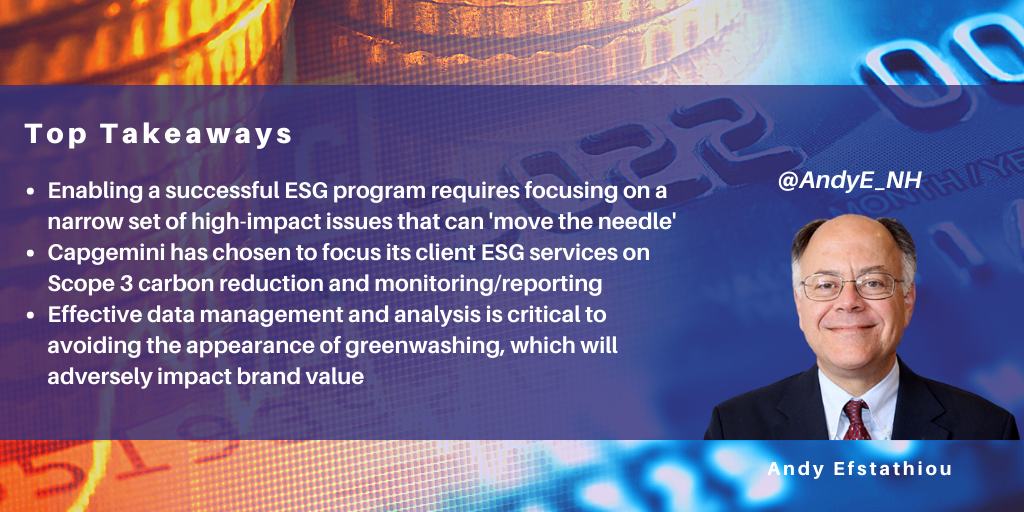Search posts by keywords:
Filter posts by author:
Related NEAT Reports
Other blog posts
posted on Aug 15, 2022 by Andy Efstathiou

ESG is a hot, but poorly defined, topic. Many firms and investors have started ESG programs, but recent allegations of “greenwashing” and ineffectiveness have undermined confidence in them. So, what are the components of an effective ESG program? ESG is a wide set of dissimilar goals (e.g., carbon emissions reduction is very different than social inclusion). By focusing deeply on a few goals, enterprises can drive more profound change while building the framework for expanding the range of ESG activities as an ESG initiative matures. With this in mind, Capgemini has developed a set of ESG services to enable clients to methodically design a roadmap for establishing goals and improving their ESG performance.
Capgemini and ESG
Capgemini began its ESG journey by focusing on carbon emissions reduction. It has built a framework for pursuing its goals and is committed to achieving carbon neutrality by 2030. The focus of its ESG efforts is:
- Reducing/neutralizing carbon footprint (it has committed to carbon neutral operations by 2025 and being a net zero company by 2030)
- Reporting on ESG scores to the marketplace and stakeholders.
By developing its internal ESG program, Capgemini experiments and brings best practices to its consulting practice. It provides support in three areas for clients:
- Commit: consulting services to identify a vision, develop a roadmap, and scale and adjust priorities over time
- Act: implementing an ESG program with actionable initiatives to drive sustainability across customers, operations, and infrastructure. Capgemini partners with BFSI clients to focus on carbon reduction by creating sustainable products and services, bringing optimization and paper reductions through sustainable operations; and finally, in green IT, accelerating initiatives around legacy modernization and Cloud migration to deliver large carbon footprint reductions. The focus within each of these three initiatives is:
- Sustainable Products/Services/Experiences: New Revenue streams or distribution models as well as new products and services to drive greater resilience and sustainability through the customer base
- Sustainable Operations: ESG programs for financial institutions typically concentrate on Scope 3 carbon emission reduction. Banks and Insurers are also actively reducing their paper usage, with marketing and internal documents the typical focus
- Sustainable IT: IT is typically one of the largest emitters for financial institutions. There are several levers that can be pulled across applications, infrastructure and ways of working. For example, Cloud migration has delivered large carbon footprint reductions because cloud data centers are typically 70% more carbon efficient than internal data centers.
- Monitor and support: monitoring and reporting on ESG efforts enable stakeholders to evaluate progress and enable compliance with regulations (ESG regulations are strictest in Europe today). Capgemini helps develop a data strategy, build a data hub, and operate a data reporting and performance evaluation program. Unstructured data is increasingly important to ESG programs. Structured data (e.g., carbon emissions) change slowly over time, but sentiment (i.e., unstructured data) changes rapidly. Monitoring and reporting on sentiment are increasingly important to the successful management of an ESG program.
BFSI client demand
BFSI clients are buying each of these three services, but few buy more than one line of service, reflecting the maturity of their ESG programs. In the past twelve months, Capgemini has delivered 50 ESG projects for BFSI clients.
The types of engagements in highest demand by banks and financial institutions are:
- ESG strategy: key project components include clarifying purpose, setup strategy, choosing priorities, design roadmap, and functional operating model
- Designing new products and services: key project components include identifying new areas to explore, developing products/services, and identifying/building partnership ecosystems
- Moving to zero paper: key project components include identifying paper intense processes, developing strategy, redesigning processes, redesigning customer interaction/channels, and digitizing documents
- Face the data challenge: key project components include identifying KPIs for business needs, designing data strategy, creating data architecture, building risk models, and building reporting dashboards
- Green IT for sustainability: key project components include calculation of carbon emissions from IT products/procedures, and identifying workload optimization strategy to mitigate emissions.
Capgemini’s accelerators include:
- Tools focused on data management and analytics, including:
- 890: a plug-and-play AI and analytics product hosted on AWS
- IDEA: Industrialized Data & AI Engineering Acceleration to reengineer an enterprise’s data estate
- ESG 360: a data hub for ESG data
- Partner ecosystem including third-party data providers and accelerators to measure ESG in banks’ portfolios
- Thought leadership and COE, including participation in ESG consortiums and panels to support critical thinking about, and broad adoption of, ESG principles.
To date, adoption of ESG initiatives has varied widely by geography, with European institutions very active in ESG, especially projects for operations and monitoring. In North America, institutions have been slow to adopt ESG initiatives, with most projects focused on consulting engagements to define ESG goals and new business models. The difference in adoption has been driven by stricter ESG regulations in Europe than in the Americas.
Conclusions
ESG encompasses a broad range of activities. Enabling a successful ESG program requires focusing on a narrow set of high-impact issues that can “move the needle” and develop internal skills relevant to ESG for an enterprise. Capgemini has chosen to focus its client ESG services on Scope 3 carbon reduction and monitoring/reporting. Financial services institutions buy ESG services based on their level of ESG maturity. Effective data management and analysis is critical to producing quality management and reporting of ESG initiatives. Failure to accurately curate data has led to widely reported incidents of “greenwashing” and immediate loss of brand value. To mitigate that risk, institutions must employ best practices, proprietary IP, and industry vendor support.
